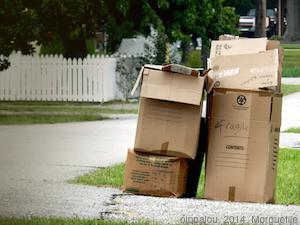
Alex Cavelli
By Alex Cavelli
“Simplify”
—Henry David Thorough
Over the last few weeks, I’ve taken lessons I’ve learned from the work of willpower scientist Colin Robertson and revealed techniques to help you develop the keystone habit of lead generation. Hopefully by now you’ve experimented and found success. Here’s a review:
Part 1: “Do Not Fail” – Choosing your daily contact goal.
Part 2: “The Seinfeld Method” – Forming consistency.
Part 3: “Definite Purpose” – Envisioning your purpose.
Based on the emails I’ve received, it seems that all three parts have made an impact. A recurring question has been, “How do I find time for lead generation when I have all this other stuff going on?” The answer: simplify.
The Minimalists
One of my favorite recent stories is about young man named Ryan Nicodemus. Nicodemus, along with his friend Joshua Fields Millburn, are two 20-something Ohioans who once believed they had it all.
“A few years ago, while approaching age 30, we had achieved everything that was supposed to make us happy: great six-figure jobs, nice cars, big houses with more bedrooms than inhabitants, pointless masses of toys, scads of superfluous stuff…The truth is we weren’t successful at all. Maybe we looked successful…but we weren’t truly successful. Because even with all our stuff, we weren’t satisfied with our lives—we weren’t happy.”
Nicodemus needed to make a change to find happiness. To begin their journey, the two friends got together and started evaluating their material possessions. “Where do we start?” asked Nicodemus. Millburn then suggested an idea that changed both their lives forever: “The Packing Party.”
Nicodemus packed all of his possessions into boxes, labeled them, and stuffed them in a spare bedroom. Now these items didn’t just consist of their expensive gadgets. They packed clothes, shoes, cleaning supplies, kitchen utensils, bedding, plates, paintings, toothpaste, food – everything. It almost looked as if they were getting ready to load a moving truck. The main idea was this: over the next 21 days, Nicodemus would unpack nothing except for what he actually used. Whatever remained would then be sold, donated, or trashed.
The results may surprise you at first. Nicodemus unpacked only about 20 percent of his possessions over three weeks! In other words, nearly 80 percent of his possessions were deemed useless or non-essential. He donated clothes he didn’t wear, sold some of his electronics, and even got rid of those unopened cleaning supplies.
The aftereffects from this packing party were an even bigger surprise. Suddenly they found more time, energy and money to focus on what actually did bring them value. Life became “rich” again as they packed (and unpacked) other parts of their lives – relationships, careers, spending habits, and dieting. Today they travel the country encouraging audiences to pare down their lives and create space for things of real value.
So how did such a simple experiment reveal the root of their discontent? And what’s the relevance to your business? Let’s ask Colin Robertson, our willpower scientist.
Science
When we come up with tasks for ourselves, our brain creates an internal reminder that will nag us until we give those tasks attention. Think about that nagging feeling you get when you’re overdue to check your social media accounts. This mental nagging actually drains our willpower and diminishes our ability to focus on essential actives.
Or think about that sense of accomplishment you get when you cross something off your to-do list. Yes, that feeling can lead to other small successes. But the opposite is also true. If we fail to complete a task, feelings of discontent take form. This experience is known as the Zeigarnik Effect. To avoid this effect, we just need a packing party.
Application
As real estate business people, we’re only as effective as the quality of our schedule and our ability to follow it. If you’re ready to have a “packing party” for your schedule to make room for the essentials, they read on and follow these steps:
- Pull up your 2015 schedule and completely clear it.
- Black out your non-working days first (these are planned days off, holidays, family commitments, vacations, etc.). Now your workdays remain.
- Next, take January 5th and consider it the template for your “ideal workday”.
- Decide the start time to your ideal workday.
- Decide the end time to your ideal workday.
- In between your start and end times, time block these essential activities:
- Hitting your “do not fail” daily contact goal
- Listing appointments
- Negotiation
- Apply this schedule to the remainder of your 2015 workdays.
Use your judgment for important activities like attending team meetings, following up with sellers, preparing for appointments, and completing essential paperwork. For example, I call my sellers every Friday between noon and 1:00pm. Some agents choose Wednesdays. I also time block time for daily administrative work between 1:00pm and 2:00pm. If I have no appointments or essential admin work, I can always work on generating leads. When planning, it’ll be helpful to keep these averages in mind:
- 8 contacts = 1 hour
- Top agents prospect 3 to 4 hours per day, between 8:00am and noon, 5 days per week.
- 1 listing appointment = 1 hour
- Top agents spend 30 minutes or less on listing appointment, schedule them between 3:00pm and 7:00pm, 5 days per week.
- Negotiation = 30 minutes
- Top agents will typically negotiate before 7:30am, between 1:00pm and 2:00pm, and/or after evening appointments.
Conclusion
You still have eight working days left in 2014 to start building momentum for the new year. Just as Nicodemus and Millburn started their journey to happiness by paring down their possessions, you can also pare down your business by starting with your schedule. Not only will free up willpower to hit your daily “do not fail” goal, you’ll discover the time and energy to surpass it and list more real estate.
For other techniques and lead generation habit tools, visit and “like” this Facebook page.
Subscribe to Willpowered for daily scientific strategies to increase willpower in other areas of your life.
Alex Cavelli is a REALTOR® with Keller Williams Greater Cleveland Northeast. Connect with Alex via linkedin.com/in/cavelli or Alexcavelli@kw.com.
